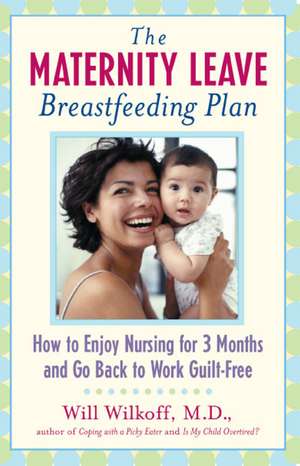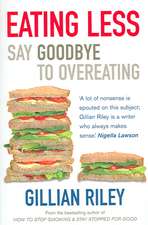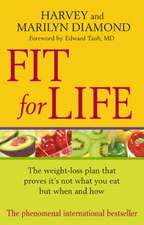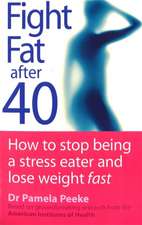The Maternity Leave Breastfeeding Plan: How to Enjoy Nursing for 3 Months and Go Back to Work Guilt-Free
Autor William G. Wilkoff M.D.en Limba Engleză Paperback – aug 2002
after a three-month maternity leave
Anyone who has ever had a baby has heard the prevailing medical wisdom that "breast is best" for baby's first food. Solid science stands behind that wisdom: Excellent studies show that there are immunological and other benefits for the breastfed baby. On the other hand, doctors and breastfeed- ing advocates rarely appreciate or even acknowledge the challenges that go along with breastfeeding until baby is ready for solid food -- anywhere from four to nine months. The simple and reasonable approach is one that many doctors and breastfeeding advocates unfortunately treat as sacrilege:
Limit breastfeeding to the length of your maternity leave.
As Dr. Wilkoff explains, the truth is that women who nurse for three months (or until their maternity leave is over) provide their children with an optimal start in terms of nutrition and can have the same rewarding experience as mothers who nurse their children much longer. In contrast to the insistence of militant breastfeeding advocates, he offers an important and comforting message: Breast is best for as long as you can comfortably manage it.
There are no guilt trips or political agendas here. Instead mothers will find:
a practical plan for establishing a nursing schedule
troubleshooting advice, including how moms can avoid becoming the baby's pacifier
help with making a smooth transition back to the workplace
and more
Preț: 97.45 lei
Nou
Puncte Express: 146
Preț estimativ în valută:
18.65€ • 19.52$ • 15.43£
18.65€ • 19.52$ • 15.43£
Carte disponibilă
Livrare economică 17-31 martie
Preluare comenzi: 021 569.72.76
Specificații
ISBN-13: 9780743213455
ISBN-10: 0743213459
Pagini: 240
Dimensiuni: 140 x 216 x 20 mm
Greutate: 0.26 kg
Ediția:02000
Editura: ATRIA
Colecția Atria Books
ISBN-10: 0743213459
Pagini: 240
Dimensiuni: 140 x 216 x 20 mm
Greutate: 0.26 kg
Ediția:02000
Editura: ATRIA
Colecția Atria Books
Notă biografică
Will Wilkoff, M.D., has been a practicing pediatrician for more than twenty-five years. He is the author of two previous books, Is My Child Overtired? and Coping with a Picky Eater, and lives in Brunswick, Maine.
Extras
Chapter 1: Do We Really Need Another Book About Breastfeeding?
It doesn't make much sense. Nursing an infant would appear to be such a simple biologic process. We seem to get along just fine without detailed instructions on how to perform our other "natural" body functions. However, "experts" continue to write books about breastfeeding. Amazon.com already lists more than two hundred titles that offer advice about nursing. How could there possibly be anything new to say about breastfeeding babies?
After all, humans have been nursing their offspring for tens of thousands of years. Why do we need another self-proclaimed expert to tell us how to do it? Particularly if that "expert" doesn't even have breasts himself.
There are numerous reasons why we need a fresh perspective on breastfeeding. First, despite the efforts of physician groups such as the American Academy of Pediatrics; public health officials, including the Surgeon General; and other breastfeeding advocacy organizations, we have made little, if any, progress in encouraging women to nurse their newborn infants. Only about 60 to 65 percent of new mothers decide to breastfeed. Of those women a good many stop nursing before their babies are a month old. By the time they are six months old, 20 percent of all babies are still being breastfed; among babies whose mothers have returned to work, only 10 percent of all babies are still breastfed. Our society is doing a poor job of recruiting women to breastfeed and is doing little or nothing to create an environment that will support those mothers who decide to nurse their babies. In the nearly thirty years that I have been practicing pediatrics, these statistics have not changed significantly.
Many mothers who have managed to nurse longer than a few weeks have told me that they have found breastfeeding confining, tiring, and unsatisfying. Although they may plan to nurse their next child, these women see this as a decision to make a sacrifice for the good of their babies. The mothers who abandon their nursing plan frequently feel that they have failed at their first attempt at parenting.
The bottom line is that we continue to do a poor job of promoting what most scientists agree is the best first food for infants. The books that have been written about breastfeeding, while factually accurate, have somehow missed the mark. We do an even worse job of educating and supporting those women who do accept the challenge, and when they don't succeed, we make them feel like failures.
Over the last quarter century of practicing pediatrics in a small college town on the coast of Maine, I have had ample opportunity to experience this sad state of affairs firsthand. I have attempted to encourage mothers to nurse when I speak at childbirth classes. I offer as much advice and emotional support as I can to the women who decide to breastfeed. Although a recent survey of breastfeeding in our community suggests that my patients are being nursed longer than those in other pediatric practices, I continue to encounter mothers who have stopped breastfeeding prematurely. Many of them have tearfully shared with me their frustration and disappointment.
Frustrated myself by the fact that too few women are choosing to breastfeed and saddened by the fact that many who do nurse aren't enjoying it, I decided to see if there was something more I could do to improve the situation. First, I had to consider the reasons for our poor success rate. Although the anatomy and physiology of the human breast has not changed in thousands of years, the demands on women have changed dramatically. When we were hunter-gatherers roaming the African savanna, mothers and their infants were in constant contact. Babies could breastfeed at will while mates and clan members were available to protect and nurture the vulnerable nursing mothers. Even as recently as a century ago the majority of women were at home with their children. Although they shouldered the majority of the household chores, mothers still had the time to breastfeed. Inexperienced mothers also had easy access to their mothers and older sisters who could function as knowledgeable breastfeeding advisers.
Compare that to the situation at the beginning of the twenty-first century. In 1970 less than 40 percent of women with children worked, but today 55 percent of child-bearing women will return to a job when their maternity leaves end. Today's new mothers may not have been breastfed themselves, and even if they were, the baby's grandmother may live too far away to serve as a hands-on adviser for more than just a few days. When a new mother does return to work, she and her baby will be together for slightly more than half of each day, and more than 50 percent of that time both will be (or at least should be) sleeping. This whole process doesn't sound so "natural" anymore, does it? It won't be surprising if breastfeeding doesn't come naturally.
This mismatch between the biologic demands of nursing and the lifestyle of the average working mother wasn't the only discrepancy I discovered as I continued my search for answers. I realized that the way we were promoting breastfeeding was actually discouraging some women from nursing. For example, the American Academy of Pediatrics has told parents that "exclusive breastfeeding is ideal nutrition" for the first six months and suggested that "breastfeeding continue for at least twelve months." Obviously the academy didn't intend to discourage women, but six months can sound unrealistic to a mother whose maternity leave is over in three.
In their attempt to promote what they know is the best way to feed babies, other breastfeeding advocacy groups are perceived as militant zealots who are willing to nurse their infants and young children anywhere, anytime, and to solve any problem. It isn't surprising that women who know they will be returning to jobs in twelve weeks are intimidated, discouraged, or just plain turned off by advice from sources that apparently don't understand an individual's situation or preferences. In other words, by overemphasizing the commitment that breastfeeding requires we have discouraged many working women from nursing, and we have made others feel guilty when they can't meet those unreasonable expectations.
No question about it, breastfeeding does require a bigger commitment than formula feeding during the first week or two when a new mother's body is adjusting to its role as a nutritional source. However, women don't have to nurse for a year or even six months to provide their babies with many, if not most, of the benefits of breastfeeding. Isn't there some way that we could get this message out and promote breastfeeding realistically in a style that would make sense for, and appeal to, working mothers?
As I looked for more answers, I discovered an interesting research paper written by two nurse-educators. These researchers observed that the working mothers in their study group who had planned shorter breastfeeding durations reported higher satisfaction with breastfeeding while still meeting the demands of their professional roles. I had noticed the same phenomenon myself. Maybe we could help more working mothers enjoy rewarding nursing experiences by advocating a shorter, more realistic breastfeeding plan. Focusing our promotional and educational efforts on this achievable goal of breastfeeding for the first three months, the length of a typical maternity leave in the United States, was the obvious choice.
As I thought more about why women stopped breastfeeding, I remembered the tearful voices of nursing mothers who had told me how tired they were and how tied down they felt. In fact during my research I discovered several studies by other physicians and nurses that listed maternal fatigue as the primary reason that mothers stopped breastfeeding. However, I know plenty of nursing mothers who haven't complained about being exhausted or confined by nursing. What was different about their experiences? The answer was that these women had not allowed themselves to become their babies' pacifiers. These mothers, sometimes by good luck, sometimes with my assistance, had helped their infants learn to put themselves to sleep. By separating breastfeeding from the sleep process, these women were able to nurse longer and enjoy the experience while those women who had allowed their breasts to become pacifiers were becoming sleep-deprived zombies. Doesn't it make sense to incorporate good sleep management strategies into our breastfeeding education programs?
It also occurred to me that the majority of women who stop nursing prematurely do so in the first few weeks. The first ten to fourteen days can be filled with anxiety, uncertainty, confusion, and discomfort. Nursing mothers who can ride out this stormy period without switching their babies to formula are very likely to continue breastfeeding until they return to work. Most mothers begin their breastfeeding experience in a hospital, though, unfortunately, many hospitals lack enough trained staff to help nursing mothers get a good start. In fact, many hospitals have policies that unintentionally discourage breastfeeding. Only a handful of hospitals in this country have even attempted to become certified as "Baby-Friendly" by WHO (the World Health Organization). Even fewer have been awarded this certification that recognizes hospitals with policies and practices that promote breastfeeding. If we want to help more women succeed at breastfeeding, we had better sharpen our focus on those critical two weeks immediately after the baby is born.
After mulling over these and other reasons for our disappointing breastfeeding record, I was ready to think about what we could do about it. First came the realization that I needed to scrap the "we" concept. Although I am a card-carrying member of the American Academy of Pediatrics, I am certainly not a "joiner" by nature, nor am I a person with much political savvy or influence. I also knew that the approach to breastfeeding that was beginning to crystallize in my mind was going to be too radical to be promptly embraced by most traditional breastfeeding advocates.
Although, swift, decisive, and substantive action by the executive and/or legislative branches of the federal government could create an economic environment that would encourage more working women to breastfeed, something told me that wasn't going to happen. If a Democratic administration that had been talking about the plight of the working woman for eight years couldn't get it done, there seemed little hope that any progress would be made during subsequent administrations.
A few enlightened corporations have created personnel policies that promote breastfeeding (only 7 percent provide designated rooms for pumping), but I didn't see much evidence that the example they set was going to trigger a national trend. It was beginning to look as though if I wanted to help working women fit breastfeeding into their lives, I was going to have to act on my own. I had already written a couple of books for parents that had been reasonably well received. If only I could convince a publisher that I had something new to say about breastfeeding. Fortunately the people at Simon & Schuster realized quickly that there was room on the shelves for yet another book about breastfeeding, and so The Maternity Leave Breastfeeding Plan was written. I will promise you as I promised them, this book really is different. If you are a working woman, it can help you enjoy a successful and rewarding breastfeeding experience.
Copyright © 2002 by William Wilkoff, M.D.
It doesn't make much sense. Nursing an infant would appear to be such a simple biologic process. We seem to get along just fine without detailed instructions on how to perform our other "natural" body functions. However, "experts" continue to write books about breastfeeding. Amazon.com already lists more than two hundred titles that offer advice about nursing. How could there possibly be anything new to say about breastfeeding babies?
After all, humans have been nursing their offspring for tens of thousands of years. Why do we need another self-proclaimed expert to tell us how to do it? Particularly if that "expert" doesn't even have breasts himself.
There are numerous reasons why we need a fresh perspective on breastfeeding. First, despite the efforts of physician groups such as the American Academy of Pediatrics; public health officials, including the Surgeon General; and other breastfeeding advocacy organizations, we have made little, if any, progress in encouraging women to nurse their newborn infants. Only about 60 to 65 percent of new mothers decide to breastfeed. Of those women a good many stop nursing before their babies are a month old. By the time they are six months old, 20 percent of all babies are still being breastfed; among babies whose mothers have returned to work, only 10 percent of all babies are still breastfed. Our society is doing a poor job of recruiting women to breastfeed and is doing little or nothing to create an environment that will support those mothers who decide to nurse their babies. In the nearly thirty years that I have been practicing pediatrics, these statistics have not changed significantly.
Many mothers who have managed to nurse longer than a few weeks have told me that they have found breastfeeding confining, tiring, and unsatisfying. Although they may plan to nurse their next child, these women see this as a decision to make a sacrifice for the good of their babies. The mothers who abandon their nursing plan frequently feel that they have failed at their first attempt at parenting.
The bottom line is that we continue to do a poor job of promoting what most scientists agree is the best first food for infants. The books that have been written about breastfeeding, while factually accurate, have somehow missed the mark. We do an even worse job of educating and supporting those women who do accept the challenge, and when they don't succeed, we make them feel like failures.
Over the last quarter century of practicing pediatrics in a small college town on the coast of Maine, I have had ample opportunity to experience this sad state of affairs firsthand. I have attempted to encourage mothers to nurse when I speak at childbirth classes. I offer as much advice and emotional support as I can to the women who decide to breastfeed. Although a recent survey of breastfeeding in our community suggests that my patients are being nursed longer than those in other pediatric practices, I continue to encounter mothers who have stopped breastfeeding prematurely. Many of them have tearfully shared with me their frustration and disappointment.
Frustrated myself by the fact that too few women are choosing to breastfeed and saddened by the fact that many who do nurse aren't enjoying it, I decided to see if there was something more I could do to improve the situation. First, I had to consider the reasons for our poor success rate. Although the anatomy and physiology of the human breast has not changed in thousands of years, the demands on women have changed dramatically. When we were hunter-gatherers roaming the African savanna, mothers and their infants were in constant contact. Babies could breastfeed at will while mates and clan members were available to protect and nurture the vulnerable nursing mothers. Even as recently as a century ago the majority of women were at home with their children. Although they shouldered the majority of the household chores, mothers still had the time to breastfeed. Inexperienced mothers also had easy access to their mothers and older sisters who could function as knowledgeable breastfeeding advisers.
Compare that to the situation at the beginning of the twenty-first century. In 1970 less than 40 percent of women with children worked, but today 55 percent of child-bearing women will return to a job when their maternity leaves end. Today's new mothers may not have been breastfed themselves, and even if they were, the baby's grandmother may live too far away to serve as a hands-on adviser for more than just a few days. When a new mother does return to work, she and her baby will be together for slightly more than half of each day, and more than 50 percent of that time both will be (or at least should be) sleeping. This whole process doesn't sound so "natural" anymore, does it? It won't be surprising if breastfeeding doesn't come naturally.
This mismatch between the biologic demands of nursing and the lifestyle of the average working mother wasn't the only discrepancy I discovered as I continued my search for answers. I realized that the way we were promoting breastfeeding was actually discouraging some women from nursing. For example, the American Academy of Pediatrics has told parents that "exclusive breastfeeding is ideal nutrition" for the first six months and suggested that "breastfeeding continue for at least twelve months." Obviously the academy didn't intend to discourage women, but six months can sound unrealistic to a mother whose maternity leave is over in three.
In their attempt to promote what they know is the best way to feed babies, other breastfeeding advocacy groups are perceived as militant zealots who are willing to nurse their infants and young children anywhere, anytime, and to solve any problem. It isn't surprising that women who know they will be returning to jobs in twelve weeks are intimidated, discouraged, or just plain turned off by advice from sources that apparently don't understand an individual's situation or preferences. In other words, by overemphasizing the commitment that breastfeeding requires we have discouraged many working women from nursing, and we have made others feel guilty when they can't meet those unreasonable expectations.
No question about it, breastfeeding does require a bigger commitment than formula feeding during the first week or two when a new mother's body is adjusting to its role as a nutritional source. However, women don't have to nurse for a year or even six months to provide their babies with many, if not most, of the benefits of breastfeeding. Isn't there some way that we could get this message out and promote breastfeeding realistically in a style that would make sense for, and appeal to, working mothers?
As I looked for more answers, I discovered an interesting research paper written by two nurse-educators. These researchers observed that the working mothers in their study group who had planned shorter breastfeeding durations reported higher satisfaction with breastfeeding while still meeting the demands of their professional roles. I had noticed the same phenomenon myself. Maybe we could help more working mothers enjoy rewarding nursing experiences by advocating a shorter, more realistic breastfeeding plan. Focusing our promotional and educational efforts on this achievable goal of breastfeeding for the first three months, the length of a typical maternity leave in the United States, was the obvious choice.
As I thought more about why women stopped breastfeeding, I remembered the tearful voices of nursing mothers who had told me how tired they were and how tied down they felt. In fact during my research I discovered several studies by other physicians and nurses that listed maternal fatigue as the primary reason that mothers stopped breastfeeding. However, I know plenty of nursing mothers who haven't complained about being exhausted or confined by nursing. What was different about their experiences? The answer was that these women had not allowed themselves to become their babies' pacifiers. These mothers, sometimes by good luck, sometimes with my assistance, had helped their infants learn to put themselves to sleep. By separating breastfeeding from the sleep process, these women were able to nurse longer and enjoy the experience while those women who had allowed their breasts to become pacifiers were becoming sleep-deprived zombies. Doesn't it make sense to incorporate good sleep management strategies into our breastfeeding education programs?
It also occurred to me that the majority of women who stop nursing prematurely do so in the first few weeks. The first ten to fourteen days can be filled with anxiety, uncertainty, confusion, and discomfort. Nursing mothers who can ride out this stormy period without switching their babies to formula are very likely to continue breastfeeding until they return to work. Most mothers begin their breastfeeding experience in a hospital, though, unfortunately, many hospitals lack enough trained staff to help nursing mothers get a good start. In fact, many hospitals have policies that unintentionally discourage breastfeeding. Only a handful of hospitals in this country have even attempted to become certified as "Baby-Friendly" by WHO (the World Health Organization). Even fewer have been awarded this certification that recognizes hospitals with policies and practices that promote breastfeeding. If we want to help more women succeed at breastfeeding, we had better sharpen our focus on those critical two weeks immediately after the baby is born.
After mulling over these and other reasons for our disappointing breastfeeding record, I was ready to think about what we could do about it. First came the realization that I needed to scrap the "we" concept. Although I am a card-carrying member of the American Academy of Pediatrics, I am certainly not a "joiner" by nature, nor am I a person with much political savvy or influence. I also knew that the approach to breastfeeding that was beginning to crystallize in my mind was going to be too radical to be promptly embraced by most traditional breastfeeding advocates.
Although, swift, decisive, and substantive action by the executive and/or legislative branches of the federal government could create an economic environment that would encourage more working women to breastfeed, something told me that wasn't going to happen. If a Democratic administration that had been talking about the plight of the working woman for eight years couldn't get it done, there seemed little hope that any progress would be made during subsequent administrations.
A few enlightened corporations have created personnel policies that promote breastfeeding (only 7 percent provide designated rooms for pumping), but I didn't see much evidence that the example they set was going to trigger a national trend. It was beginning to look as though if I wanted to help working women fit breastfeeding into their lives, I was going to have to act on my own. I had already written a couple of books for parents that had been reasonably well received. If only I could convince a publisher that I had something new to say about breastfeeding. Fortunately the people at Simon & Schuster realized quickly that there was room on the shelves for yet another book about breastfeeding, and so The Maternity Leave Breastfeeding Plan was written. I will promise you as I promised them, this book really is different. If you are a working woman, it can help you enjoy a successful and rewarding breastfeeding experience.
Copyright © 2002 by William Wilkoff, M.D.
Cuprins
Contents
Acknowledgments
Appendix 1. Burping Your Baby
Appendix 2. What Medications Can I Take While I Am Nursing?
Appendix 3. Nursing Your Premature Infant
Index
Acknowledgments
- Do We Really Need Another Book About Breastfeeding?
- What Is the Maternity Leave Breastfeeding Plan?
- Why Should I Breastfeed My Baby?
- I'm Afraid I Won't Like Breastfeeding Because...
- An Energy Crisis in the Making
- Caught Between Cycles, Understanding Your Place in History
- How Long Should I Breastfeed My Baby?
- Preparing Your Mind and Adopting an Attitude
- A Plan for the Three Months Before You Deliver
- Your Husband's Role in the Plan
- D-Day
- The First Day...and Night
- Day Two
- The First Night Home
- Days Three, Four, and Five
- Is My Baby Gaining Weight?
- Week Two: Winning the Battle Against Fatigue
- Week Three: "I Will Not Become a Pacifier..."
- Week Four: Adjusting to the New Reality
- The Second Month: Striking a Balance
- The Third Month: Enjoying Your Baby and Making Transitions
- The Rest of the Story (Months Four Through Twelve)
- Nursing Your Second Child
- In Defense of Realism
Appendix 1. Burping Your Baby
Appendix 2. What Medications Can I Take While I Am Nursing?
Appendix 3. Nursing Your Premature Infant
Index











